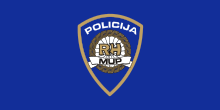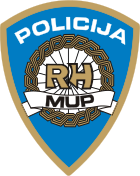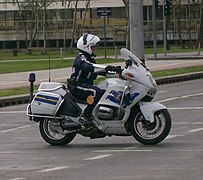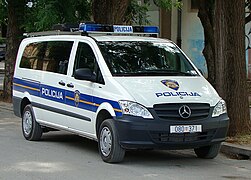|
Law enforcement in Croatia
Law enforcement in Croatia is the responsibility of the Croatian Police (Croatian: Hrvatska policija), which is the national police force of the country subordinated by the Ministry of the Interior of the Republic of Croatia, carrying out certain tasks, the so-called, police activities, laid down by law.[2] The Police deals with the following affairs: protection of individual life, rights, security and integrity, protection of property, prevention and detection of criminal offences, misdemeanors, search for perpetrators of criminal offences, violations and their bringing before competent authorities, control and management of road traffic, conducting affairs with aliens, control and security of state border, and other affairs defined by law.[3] In the operative sense, police affairs are divided into affairs related to public peace and order, affairs related to security of public gatherings, affairs of the border police, affairs of safety of road traffic, affairs of counter-explosive protection, affairs of the criminal police, crime-technical affairs, crime-files affairs, administrative affairs, nationality-related affairs, status questions and asylum, affairs of protection and rescue, inspection affairs and technical affairs.[3] In recent years, the force has been undergoing a reform with assistance from international agencies, including the Organization for Security and Co-operation in Europe since OSCE Mission to Croatia began there on 18 April 1996, with Croatia being admitted to OSCE on March 24, 1992.[4] Police powersPolice officers' powers in order to maintain peace in Croatia, such as the power to stop and search, seize property and use force, are regulated.[5] A police officer in Croatia may only stop and search a person if a court has issued a warrant, and it is possible that this person has broken the law or is in possession of items or tools which are considered unlawful.[citation needed] A police officer is only allowed to use firearms if there is an immediate threat to his own life or the lives of other people, to prevent a crime from being committed for which the minimum prison sentence is five years or more, or to prevent the escape of a prisoner caught committing an offence for which the prison sentence is a maximum of ten years.[5] Organization The General Police Directorate (Croatian: Ravnateljstvo policije) is an administrative organization of the Ministry of the Interior constituted for conducting police affairs. The General Police Directorate is responsible for:[2]
General Police Directorate is headed by General Police Director (Croatian: glavni ravnatelj policije). There are the following organization forms within General Police Directorate:[6][7]
For immediate conducting of police affairs there are 20 Police Administrations (policijske uprave) divided into four categories, which cover the territory of the Republic of Croatia according to the organization of units of local self-government (counties or županije). Police stations are established for direct police and other affairs in each Police Administration. Border controlCroatia has had an external border with the Schengen area since the accession of the country to the EU. As part of the major migration movements from 2015, Croatia became part of the so-called Balkan route. The European Border Agency Frontex has a small mission in Croatia to assist the police at various border crossings. In July 2018 Frontex organized the air reconnaissance of the border with Bosnia with a reconnaissance aircraft as part of the Frontex 'Multipurpose Aerial Surveillance (MAS). The aircraft transmit moving images of remote sensing cameras in real time to the Frontex Situation Center (FSC) in Warsaw, Poland.[8] In 2023, Croatia became a Schengen Zone member state. CriticsFor several times NGOs report, that the Croatian police illegally and arbitrarily deport refugees to Bosnia-Herzegovina, i.e. from the EU (push-backs). It would come again and again to attacks by the Croatian officials on the refugees.[9][10][11] Working conditions Croatian police have salaries much lower than the average salary in the country, and has the lowest net wage among all EU countries. For a full-time police officer, the monthly wage amounts approximately to €700; this has been attributed, justly or unjustly, to the declining interest of new candidates at the police academy. Much effort has been invested in media to popularize the profession of law enforcement; absent significant salary increases, however, such efforts have been criticized, before the fact, as futile. Equipment Despite having access to Schengen funds and investing significant amount of money in various equipment, it has been claimed that the basic needs of officers are incompletely covered; for example, winter parka jackets are issued to the officer upon initial tour of duty, and in some cases it has been claimed that reissues even after 10 years of service were unavailable. RanksRegular Police (Temeljna policija)Intervention Police (Interventna policija) Special Police (Specijalna policija) Weapons
EquipmentSince 2013, there were special efforts by the Ministry of the Interior to equip the Croatian police with new vehicles and uniforms. Police cars consist mainly of mostly Škoda Octavias, 4-door Opel Astras, some Citroën C-Elysées and, more prominently, Ford Focuses (unmarked sedans and marked estates).
Helicopters
ControversiesAccording to human rights organizations, Croatian police has been accused of overt and, generally unpunished, brutality. Amnesty international has issued a detailed report on the allegations of torture of refugees and migrants,[17] while the Human Rights Watch has criticized the organization impunity of violence and unlawful pushbacks at their borders.[18] In 2021, the Border Violence Monitoring Network published a report into the use of torture and inhuman treatment during pushbacks by Croatian police.[19] They assert that:
Corruption
In 2002, accepting bribes was a common form of street police corruption in Croatia. According to the International Victim Crimes Survey, 15 out of 100 respondents reported paying a bribe within the last year – 44% of which were paid to police officers. This frequency was higher than most other East-European countries, with respondents suggesting that police in Croatia were targeted more frequently for successful bribes compared to other countries in East-Europe. These results indicated that police corruption, especially in regards to the acceptance of a bribe by a police officer, seemed to be more prevalent among Croatian police than among police in other East-European countries.[20] See also
Notes
External linksWikimedia Commons has media related to Police of Croatia. |
|||||||||||||||||||||||||||||||||||||||||||||||||||||||||||||||||||||||||||||||||||||||||||||||||||

























![Agusta-Bell 212[13]](http://upload.wikimedia.org/wikipedia/commons/thumb/d/d5/Croatian_police_Augusta_Bell_212.jpg/297px-Croatian_police_Augusta_Bell_212.jpg)
![Bell 206B-3 JetRanger III[13]](http://upload.wikimedia.org/wikipedia/commons/thumb/3/32/Croatian_police_helicopter_Bell_206_B.jpg/224px-Croatian_police_helicopter_Bell_206_B.jpg)
![Bell 206B JetRanger II[13]](http://upload.wikimedia.org/wikipedia/commons/thumb/3/32/Croatian_Police_Helicopter.jpg/240px-Croatian_Police_Helicopter.jpg)